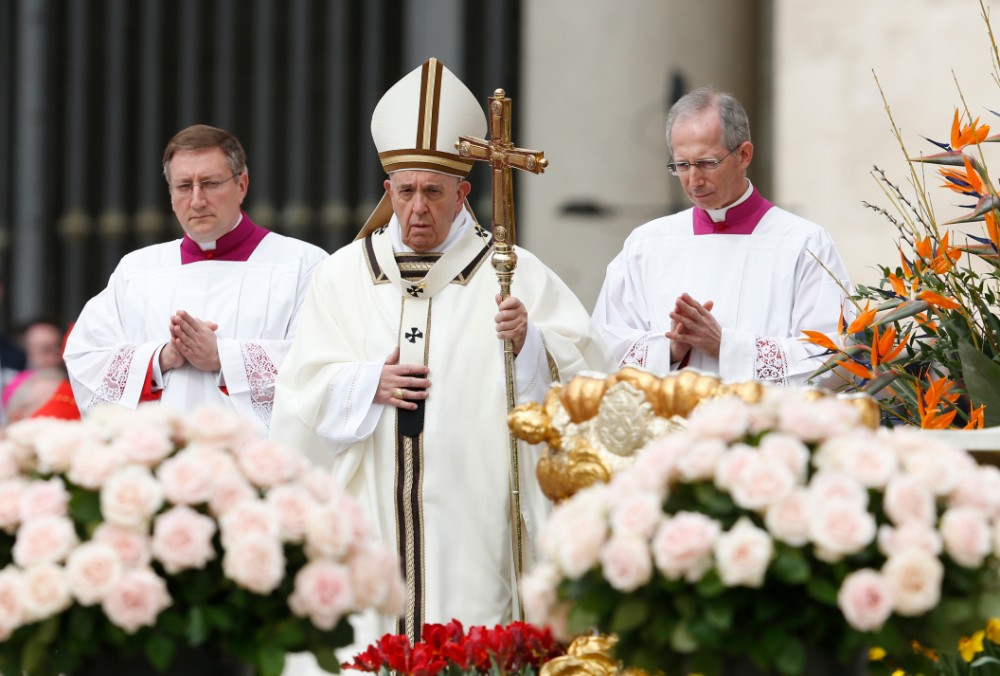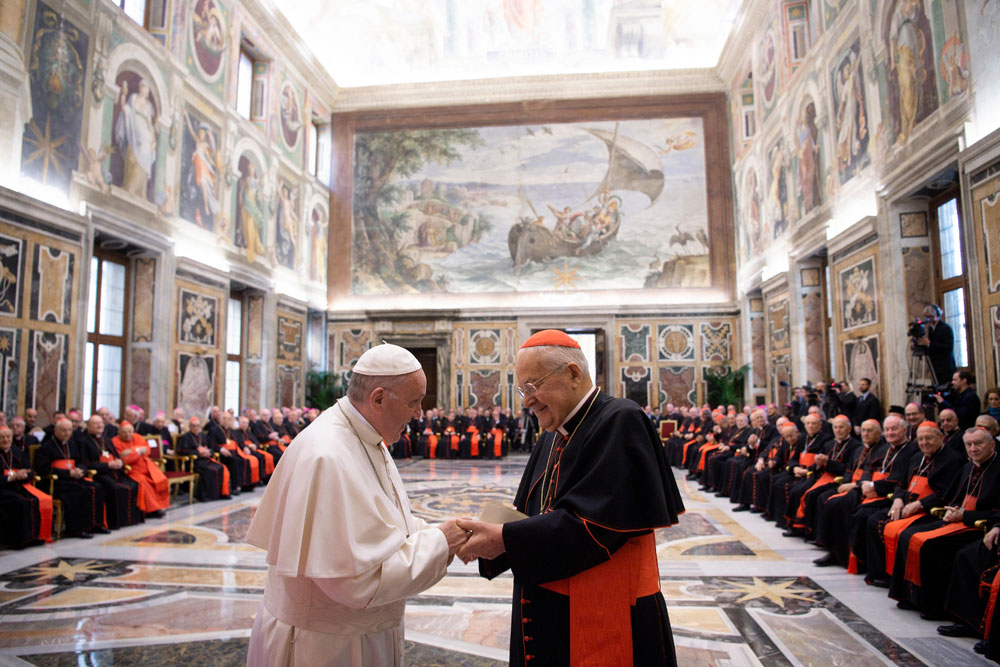Pope Francis’ reforms of the Roman Curia will see the creation of a new “super ministry” dedicated to evangelisation that will take precedence over the once-powerful Vatican doctrinal body.
The Congregation for the Doctrine of the Faith, formerly the Holy Office of the Inquisition, is the oldest institution in the Curia and known as “La Suprema.” For years, it policed theologians, set out the red lines of Catholic doctrine and gave its rubber stamp to all major Vatican documents.
But according to Vida Nueva, the respected Spanish Catholic publication, the congregation will no longer hold the number one spot in the curia. Under Francis the CDF has already lost significant influence, and the new constitution formally sets out that it now comes under the new mission statement of spreading the Gospel.
The changes are contained in the new Apostolic Constitution on the Roman Curia, Praedicate Evangelium (“Preach the Gospel”) drafted by the Pope and his council of cardinal advisers over the last five years, and which could be published on 29 June, the Feast of Sts Peter and Paul.
The whole thrust of the constitution puts evangelisation at the heart of the Roman Curia's mission, meaning that every aspect of Catholicism’s civil service, must flow from this.
“Pope Francis always emphasises that the Church is missionary. That is why it is logical that in first place we have put the Dicastery for Evangelisation and not the Doctrine of the Faith,” Cardinal Oscar Rodriguez Maradiaga, the co-ordinator of the council of cardinals, told Vida Nueva for an article to be published in the magazine on Saturday and seen by The Tablet.
“In this way the Holy Father has sent a significant message of reform to the People of God.”
Cardinal Oswald Gracias, another member of the council of cardinals - which is now made up of six members - stressed that this new department will become the “first dicastery.”
He explained: "The key point in the new apostolic constitution is that the mission of the Church is evangelisation. It [the constitution] puts it [evangelisation] in the centre of the Church and of everything that the curia does. It will be the primary dicastery. The title of the text shows that evangelisation is the number one objective, taking priority over anything else."
In practical terms, the super dicastery on evangelisation will come from a merger of the Pontifical Council for the New Evangelisation, set up by Benedict XVI in 2010 and the Congregation for the Evangelisation of Peoples, which oversees the Church in the old mission territories. Known as Propaganda Fidei it is a powerful part of the Curia with a large budget and influence over appointment of bishops. Its prefect is known as the “Papa Rossa” (“Red Pope”).
Another reform set out by the constitution includes the establishment of the Pontifical Council for the Protection of Minors as part of the curia which would give the Pope’s child protection body greater authority and make it more effective. One of the difficulties the commission has faced has been a lack of any legal status in the Vatican.
Along with its theological work, the CDF oversees the church trials of priests accused of clerical sexual abuse, although it is not clear how the protection of minors body will work with the doctrinal one on this matter.
Meanwhile, Vida Nueva reports that a new dicastery which carries out charitable works in the name of the Pope could also be created in the new constitution.
Francis has already bolstered the charitable office of the papal almoner by making its current incumbent, Konrad Krajewski, a cardinal, although his role is Rome-based and could be expanded. A department based on charity would also demonstrate that bringing the Gospel means words must be accompanied by actions.
"After evangelisation, has to come charity," Cardinal Maradiaga said.
Founded in 1542, the Congregation for the Doctrine of the Faith was set up to spread “sound Catholic doctrine.”
Under the 23 year leadership of Cardinal Joseph Ratzinger - now Pope Emeritus Benedict XVI - it gained a reputation for investigating and disciplining theologians and played a major role in the Church's internal doctrinal battles.
During the Francis pontificate, the investigations of theologians by the congregation have dried up and the CDF has taken a back seat under a pastoral Pope who wants doctrine applied to the Church’s mission rather than drifting into ideology.
But Cardinal Gerhard Muller, who served as prefect of the congregation under Francis until his dismissal in 2017, argued that his role meant he was responsible for “theologically structuring” the Francis papacy because the first Latin American Pope was “more pastoral.”
This, however, appeared to be an overstatement of his role given that up until 1965 Popes acted as prefects of the doctrine congregation, and it is the Roman Pontiff who has “supreme, full, immediate and universal” power in the Church.
Since his departure from office, Cardinal Muller has become one of Francis’ most outspoken critics.
The new constitution is set to underline the importance of the Vatican and the Roman Curia being at the service of the Pope and local churches, placing diocesan bishops on a par with the prefects of curial departments.
In the decades since the Second Vatican Council (1962-65), which envisioned an enhanced role for local bishops and churches, there have been numerous complaints that some officials in the Roman Curia overreached their authority.
Rather than working with local bishops, in years gone by diocesan bishops found themselves being bossed around by Vatican officials, particularly when it came to questions of the liturgy and vexing doctrinal matters.
This Pope made the council's reforms the guiding light of his pontificate, calling for a “cautious decentralisation” in the Church and handing greater powers to local bishops when it comes to liturgical translations.
The new constitution also envisages putting more laity into positions of leadership - something long talked about - and merging the Pontifical Council for Culture and the Congregation for Catholic Education into one body. There will no longer be distinctions between councils and congregations, which will be known as dicasteries.
But Cardinal Maradiaga made clear the reform has not just been about merging congregations: “the main objective is to underline the importance of lay people in the Church and for the Church.”
The new constitution makes clear that not only clerics need to be in charge of departments (currently there is one lay man in charge of Vatican dicastery - Paolo Ruffini, the prefect of the communications department).
There is also a possible downgrading in the influence of the role of the Secretariat for the Economy, once led by Cardinal George Pell.
Cardinal Pell, now in an Australian prison after being convicted for sexual abuse offences against children, had sought to make himself the "manager of the Holy See" on financial matters. But Vida Nueva reports that on the hierarchal flow chart it now comes under the major dicasteries.
The council of cardinals is due to discuss Praedicate Evangelium, which updates John Paul II’s 1988 constitution Pastor Bonus, during their meeting on 25-27 June.
While it is possible Praedicate Evangelium will be promulgated by the Pope on 29 June, the Feast of St Peter and St Paul, this could be delayed as bishops' conferences across the world and the Roman Curia have been asked to offer feedback on the draft of the text. These need to be sent through by the end of May.
Significant changes to the text are not expected, as this is the final round of consultation.
“The Pope wanted a long process in which ideas could take off without leaving people behind,” Cardinal Gracias said.
After the new document is published the council of cardinals will continue to advise the Pope on reforms including an update on Canon Law and brainstorm new ideas on matters such as financial management and the role of women.
Cardinal Maradiaga told Vida Nueva that a synod of bishops could be called to apply the “practical ecclesiology” envisaged by the new constitution.
“The Holy Spirit continues to blow,” he said. “It does not take a siesta or go on holiday."



 Loading ...
Loading ...